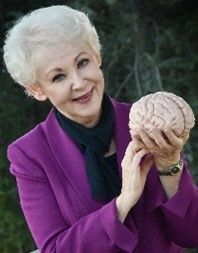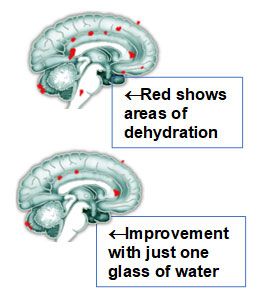Dehydration Revisited
©Arlene R. Taylor, PhD
 Sitting at Andrew’s kitchen table in front of pizza—he always has white sauce and cheese only on half of it when I am visiting—I could see he was somewhat improved since his unexpected visit to the Emergency Department for extreme dehydration. It must have been quite a wake-up call because he pointed out three one-liter bottles on the sideboard. “I plan to drink three of these a day,” Andrew said proudly. “Thirsty or not.”
Sitting at Andrew’s kitchen table in front of pizza—he always has white sauce and cheese only on half of it when I am visiting—I could see he was somewhat improved since his unexpected visit to the Emergency Department for extreme dehydration. It must have been quite a wake-up call because he pointed out three one-liter bottles on the sideboard. “I plan to drink three of these a day,” Andrew said proudly. “Thirsty or not.”
I smiled encouragingly. “How do you know if you are sufficiently hydrated?” I asked, thinking of my school-teacher mother who would quiz my brother and me on almost anything she thought we should know.
“Check for one or two pale urines a day, Teach,” he replied.
“Good boy. That’s an A+. An A for knowing the answer and a + for answering so quickly.” Andrew rolled his eyes and generated a smirky smile.
“I have been waiting for more information on the dastardly consequences of dehydration,” he said. “I have a question. You mentioned that there is generally more water inside brain cells than outside. Why is that?”
“Normally there is more water inside the cells than outside—dehydration reverses that ratio. Since most chemical processes occur inside the cell, a reduction in sufficient water can trigger incomplete or inaccurate chemical processes. This can influence the production of hormones, enzymes, neurotransmitters, and even impact cell replication.”
Andrew put a second slice of pizza on my plate. “Production of neurotransmitters?” he asked, looking puzzled.
“Yes. Water is required to create neurotransmitters. They are key in assisting cognitive (thinking) processes including moving information across the space (synapse) between neurons. This process is so critical to thinking that nerve transmission of information along neuronal pathways that is uses more than half of all the brain’s energy.”
“Energy?” asked Andrew, helping himself to a third slice of pizza. I was keeping track!
“Yes, energy,” I replied. “Water generates the electrical energy for all brain functions—the movement of water in and out of the cells functions much like a hydroelectric plant to create energy. As hydro-electric power is generated within the brain it is stored as Adenosine triphosphate or ATP. It provides the energy for most of the energy-consuming activities of the cells and transports chemical energy within cells for metabolism. I think we’ve talked about in the past how the brain generates enough hydro-electricity to power a low-wattage light bulb.”
“I get it,” said Andrew. “Any interference in electrical energy can mean a ‘dim’ light bulb.” I ignored that comment.
“In a resting state, the brain grabs at least 20 percent of the total energy supply. Brain cells need at least twice the energy required by other cells in the body. Water provides this energy more effectively than any other substance. When water levels fall within the cells, energy generation also falls. Dr. Corrine Allen, founder of founder the Advanced Learning & Development Institute, has pointed out that individuals with brain challenges such as ADHD, head injuries, anxiety disorders, depressive disorders, and the autism spectrum often drink little if any water each day. The resulting dehydration contributes to their symptoms. Her opinion was that a sufficient intake of alkaline water could be beneficial for many of such brain challenges—even Parkinson’s and some dementias.”
“I wonder what she would say about hydrogen water!” Andrew exclaimed. “By the way, I saw a poster in the Emergency Department that said, ‘The brain is the most important organ you have—according to the brain.’ I thought that was funny.”
“Humorous and also probably true,” I replied. “Studies have shown that body organs will give up their need for water in favor of the brain. A physician lecturer once said that if the brain needs water and none is forthcoming, it will direct the bladder to dehydrate urine and send fluid up to the brain. He brought down the house with his comment: ‘That’s puts a different spin on the term pee brain!’”
“I remember asking you how much water you need on a daily basis, and you said it depends on environmental temperature, humidity, level of exercise, clothing, efficient sweating … Wish I had remembered that earlier today!”
 “As the blood thickens, the risk of blood clots increase in the brain, heart, legs, and lungs. Transport of oxygen, hormones, and neurotransmitters can be interrupted. The removal of waste in the body can be slowed, contributing to fatigue, sluggishness, and a sense of feeling run down. As lymph fluid thickens, this interferes with the brain’s immune system and can reduce the timely removal of brain toxins.”
“As the blood thickens, the risk of blood clots increase in the brain, heart, legs, and lungs. Transport of oxygen, hormones, and neurotransmitters can be interrupted. The removal of waste in the body can be slowed, contributing to fatigue, sluggishness, and a sense of feeling run down. As lymph fluid thickens, this interferes with the brain’s immune system and can reduce the timely removal of brain toxins.”
“Which is the reason dehydration is now linked with dementia,” intoned Andrew. “I’m getting it!” He looked at the last piece of pizza. “Is this yours or mine?”
“How many did you have?” I asked.
Andrew shrugged.
“Five percent reduction in cognition . . .” I began. “Having trouble counting, I see.” Unapologetic, I took the last piece. “You had five slices.”
“Touché, Doc,” Andrew said laughing. “I’ll settle for another glass of water.”

